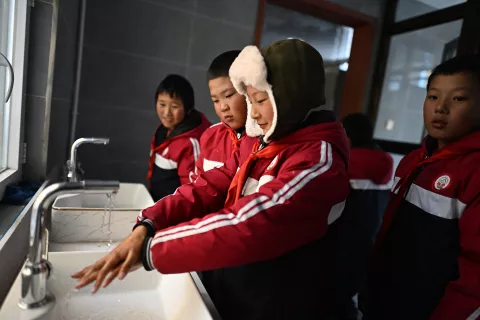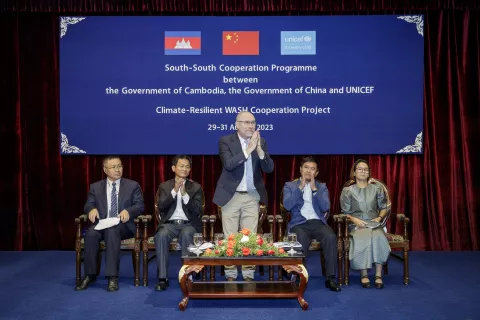UNICEF to support water, sanitation and hygiene in China's quake zone
- Available in:
- 中文
- English
BEIJING, 1 July 2008 – Now that more than 5 million people have been relocated to temporary shelters due to the 12 May Sichuan earthquake, provision of safe water and sanitation is a top priority. A recently concluded UNICEF mission has found that in most tent camps and densely populated settlements, access to safe water and sanitation facilities and the promotion of good hygiene behaviour are improving but still inadequate.
According to a June 11 report, the Ministry of Water Resources found that 72,400 rural water supply systems and 36,500 kilometres of water distribution pipelines were damaged by the earthquake, affecting water supply to a population of more than 9 million people. A large number of latrines in the worst affected areas have also been damaged. According to UNICEF's assessment, 4,185 villages and 446 townships in the worst affected counties in Sichuan need to repair sanitation facilities.
"In relocation camps and other densely populated settlements there is an urgent need to improve water and sanitation services such as the disposal of human waste, sewage and drainage systems," said Yang Zhenbo, UNICEF Water, Sanitation and Hygiene Specialist. Yang has recently returned from a mission to Beichuan, Mianzhu, Shifang, Pengzhou and Dujiangyan in Sichuan.
"Most of the displaced people are using makeshift toilets - sometimes just very simple pit latrines without water flush or waste treatment facilities. Those latrines are especially dangerous for children and the elderly to use."
"Chinese authorities have dispatched staff to every settlement to monitor disinfection, the quality of water and food and promotion of hygiene practices," said Yang, "I am quite impressed with the efficiency of China's disease control authority." Since the 12 May earthquake no major outbreaks of sanitation and hygiene related illness have been reported.
Experts suggest that in the next 2 to 3 months, vigorous efforts will be needed to prevent disease outbreaks. As more refugees are transferred to temporary camps, there is a need for inter-sectoral coordination, especially in the design of sanitation and water facilities in the newer settlements. More water distribution networks needs to be set up to address the needs of increasing number of relocated people who are moved from the quake-induced lake areas.
UNICEF is finalizing a joint water and sanitation programme with the Government of China to cover the needs of several million children and their families now living in shelters. When finalized, the programme is expected to have a budget of US$ 5 million. It will provide technical support and supplies to local partners in water supply, sanitation, hygiene and health education that will cover prefabricated camps, tents, hospitals and schools. The joint project will concentrate on four counties in Sichuan: Pengzhou, Mianzhu, Beichuan, and Qingchuan.
On June 30, UNICEF delivered 25,858 packages of water purification tablets worth US$1,454,081 to Pengzhou and Mianzhu. Another batch of 53,000 packages will arrive in the next few weeks. The whole consignment is expected to benefit 2 million people for 3 months. With the help of such tablets, water pumped from uncertain sources can be made safe to drink.
Media contacts
About UNICEF
UNICEF works in some of the world's toughest places, to reach the world's most disadvantaged children. Across 190 countries and territories, we work for every child, everywhere, to build a better world for everyone. For more information about UNICEF and its work for children visit www.unicef.org.
| Visit UNICEF China website: www.unicef.cn Follow us on Sina Weibo: http://weibo.com/unicefchina Tencent Weibo: http://t.qq.com/unicef Wechat: unicefchina |



